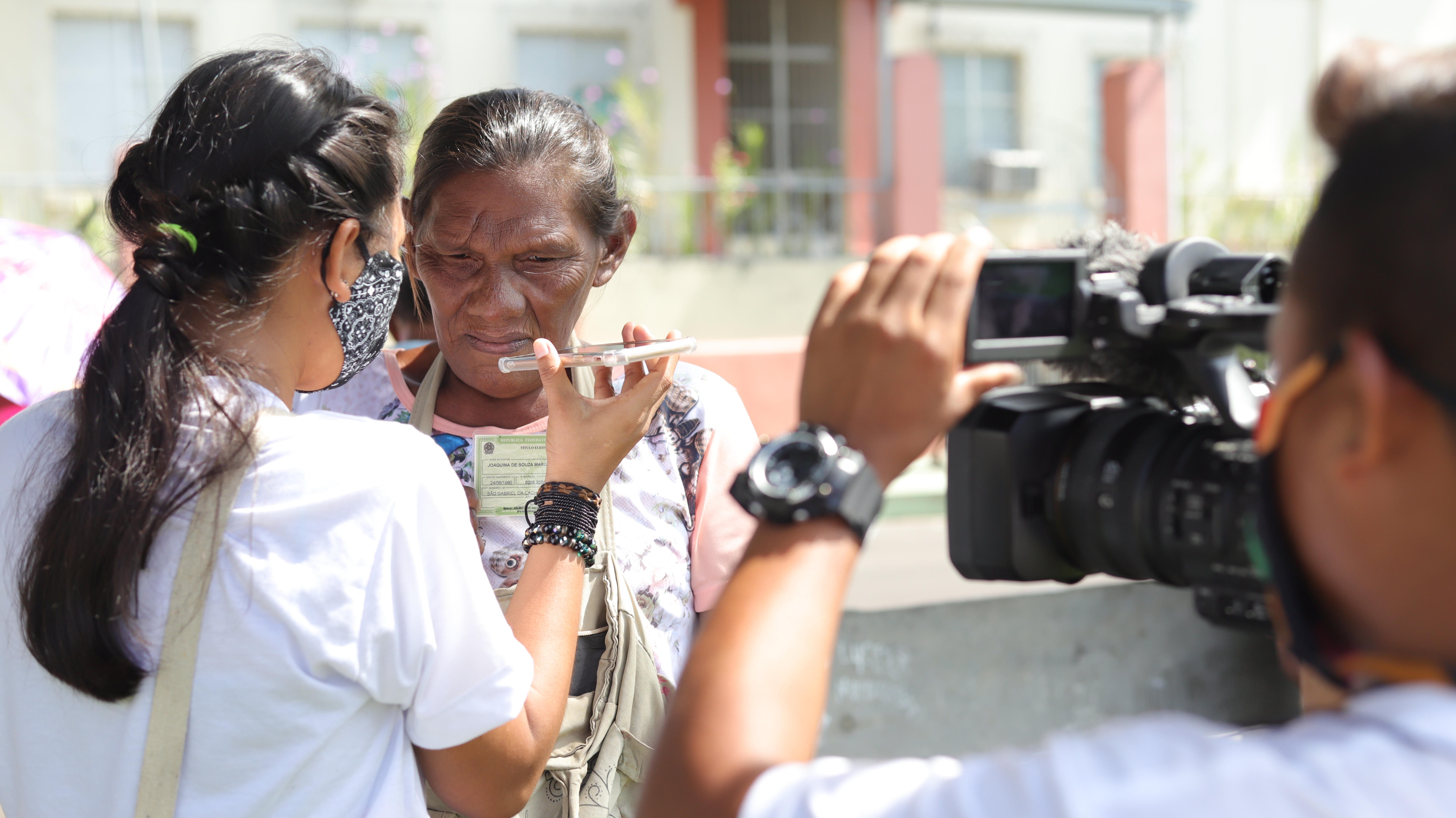

As disinformation campaigns spread lies about health and environmental risks across the Amazon in recent years, Indigenous community members have stepped up to combat fake news.
Rede Wayuri is a network of 55 Indigenous communicators in the Rio Negro region of Brazil. Through their use of WhatsApp and local radio, they have not only reported on topics like illegal mining in the Amazon, but also distributed accurate information about the COVID-19 pandemic and vaccines.
At the World Justice Forum in The Hague this past June, Rede Wayuri was presented with the World Justice Project’s Rule of Law Award for their outstanding work in countering disinformation by bringing accurate, reliable information to 23 Indigenous peoples and 750 communities in five local languages and Portuguese.
In his acceptance speech, Rede Wayuri co-founder and Indigenous community leader Marivelton Barroso spoke of the network’s mission of resistance in Portuguese, with interpretation from Juliana Radler of Rede Wayuri partner organization Instituto Socioambiental. Below, you can watch the full presentation and read his remarks in English.
------
Good evening, distinguished colleagues and rule of law defenders.
My name is Marivelton Barroso, I am a Baré Indigenous person from the Brazilian Amazon region of Black River or Rio Negro, on the border with Venezuela and Colombia.
Colonial exploitation and religious missions persecuted our culture, our language, and our spirituality.
We, the Indigenous peoples of the Amazon, are resistant and resilient. We have resisted for over 500 years.
Today, the Indigenous population in Brazil is growing and we number approximately 1.3 million Indigenous people throughout Brazil, belonging to 305 different ethnic groups.
The growth of our population is a direct result of the 1988 federal constitution, which for the first time recognized the rights of Indigenous peoples in Brazil to demarcated Indigenous territory and our culture.
It is because of the Indigenous lands that our Rio Negro region is preserved. Archaeological studies prove more than 3,000 years of presence of the 23 ethnic groups in the region. We have lived in the Amazon for millennia without destroying it, helping to preserve it and increase its biodiversity.
However, since the promulgation of the constitution, our rights have never been so threatened. The current Brazilian government is openly anti-Indigenous and is pressing for legislation to remove our rights to territory.
Furthermore, the government is promoting the dismantling of the environmental protection structure in Brazil, weakening control and compliance mechanisms, and promoting a campaign of disinformation and denialism about the increase in environmental destruction.
In this sense, the Wayuri Network plays a key role through Indigenous communicators located in urban areas and communities, producing local journalism, distributing truthful information countering the fake news narrative that promotes fear and contributes to the increase of violence and destruction in the Amazon.
The monitoring of lies in the region is done through WhatsApp by the Wayuri Network, alerting the Indigenous population about threats to their rights.
Wayuri in the Indigenous language Nheengatu means collective work. Besides bringing information, we believe that the work of the Wayuri Network also brings education, information and political training. This strengthens our communities and our actions towards sustainable development in Negro River.
I also take the opportunity of my speech to denounce once again that the Yanomami people, who inhabit the largest demarcated Indigenous land in Brazil, suffer serious violations of their rights because of the invasion of approximately 25,000 illegal miners.
Mining harms not only the land but also its people. Women and children are the main victims of these abuses. We have proven reports of rapes and deaths caused by miners inside Yanomami land, without any governmental response.
The government turns a blind eye to the humanitarian crisis within the Yanomami Indigenous land, partly located in the Rio Negro region. The Wayuri Network includes Yanomami communicators, who play a key role in raising awareness about this situation.
Mining, including artisanal mining, poses serious risks for the Amazon and its population. By dumping poison, such as mercury, in the rivers, it contaminates the fish, which are the basis of our food, affecting our health and the forest. In the face of this, I leave the question: What kind of democracy is this that does not respect its own federal constitution?
In this threatening political and social context, we face the COVID-19 pandemic in our region. The proliferation of fake news has put many lives at risk. In this sense, the communicators of the Wayuri Network had the courage to act throughout the pandemic by producing truthful information and making Indigenous people aware of the dangers of the disease.
We acted quickly to produce truthful counternarratives to the lying news, including those released by the president of the Republic himself, against vaccination and other preventive measures.
For this work, Reporters Without Borders, in 2021, named Wayuri Network as one of 30 global information heroes during the COVID-19 pandemic.
I highlight here the names of the women communicators: Cláudia Ferraz, from the Wanano people, Edneia Teles, from the Arapaso people, Janete Alves, from the Desana people and Elisângela da Silva, from the Baré people.
These women are fundamental in combating misinformation and promoting the campaign "Black River, We Ttake Care" to raise funds for emergency support for indigenous communities and expansion of the communication infrastructure in the Rio Negro, which is essential to protecting the rights of indigenous peoples.
It is with immense emotion and joy to be here with you today to receive this important award as a representative of the Wayuri Network of Indigenous Communicators. We are very honored by this recognition.
Kuakatu reté, thank you in my language Nheengatu.






